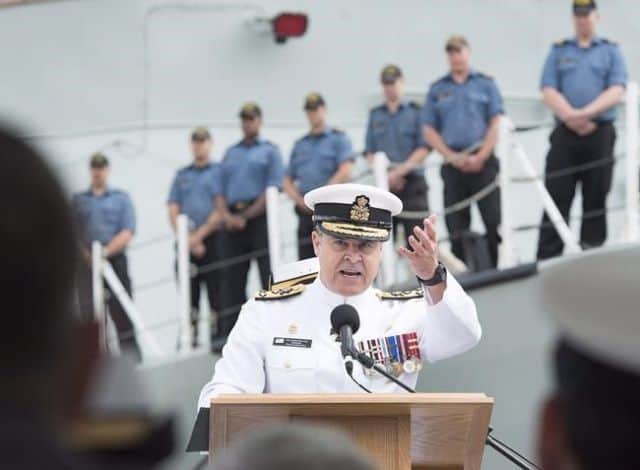
Canada’s top sailor says he is currently “comfortable” with having only one temporary support ship in the water, as the Trudeau government faces pressure from Quebec and opposition parties to lease a second one.
The federal government awarded Quebec-based Davie Shipbuilding a $700-million contract to convert a civilian container ship into a temporary supply vessel and lease it to the navy for at least five years.
The deal, negotiated by the Harper Conservatives and finalized by the Trudeau Liberals, was intended to address a serious gap in the navy’s ability to conduct overseas missions after retiring its previous two support ships in 2015.
Davie delivered the MV Asterix to the navy last year; the vessel recently returned from a six-month deployment around Asia and the Pacific and is currently docked near Victoria in preparation for a second tour.
The Quebec government, Davie and federal opposition parties have since stepped up pressure on Ottawa to move ahead on a contract for a second temporary ship to address the navy’s needs and support local workers.
But in an interview, Royal Canadian Navy commander Vice-Admiral Ron Lloyd indicated that he did not currently believe the MV Obelix, which Davie is offering to convert and lease for $500 million, is needed.
“If you’re asking me in terms of where we find ourselves as a navy, am I comfortable with one interim (support ship)?” Lloyd said. “I’m comfortable.”
That comfort, he said, is based on when officials expect to receive two permanent support ships that are being built in Vancouver. The latest schedule calls for the first joint support ship, as the permanent vessels are known, to be delivered in 2022-23.
“Right now, the Asterix is delivering on our requirement predicated on the timelines for the joint support ship.”
The Trudeau government last year approved a plan to start cutting some steel on the joint support ships ahead of schedule as Seaspan’s Vancouver Shipyards waited for the Canadian Coast Guard to finish design work on a science vessel.
The Defence Department’s procurement chief, Patrick Finn, said in a separate interview that things have progressed further than anticipated as the front half of the first joint support ship is nearing completion.
That, combined with many of the lessons learned over the past number of years, have led officials to have a high degree of confidence that the first vessel will be ready by summer 2023, Finn said.
Lloyd would not speculate on whether his view would change if the schedule for the joint support ships slipped again, saying it is “not helpful” to talk in theoreticals.
Finn’s confidence wasn’t shared Thursday by Davie and the union representing its workers, however, both of which noted that the joint support ships have experienced numerous delays over the years.
Construction on the first ship was supposed to start in 2016, with delivery this year, but that schedule has changed several times even as the cost for the project has grown to $3.4 billion from an initial budget of $2.3 billion.
“The track record of the (national shipbuilding) strategy is abysmal,” said Davie spokesman Frederik Boisvert. “It’s failure after failure after failure. Nobody right now can guarantee the timeline.”
The federal government agreed last year to purchase three second-hand icebreakers from Davie for the coast guard and has tapped it to do maintenance work on three of the navy’s frigates starting in 2021.
But Boisvert said the shipyard is nonetheless down to roughly 200 workers from a high of more than 1,000 when Asterix was being converted, and that the Obelix contract would support hundreds more jobs.


